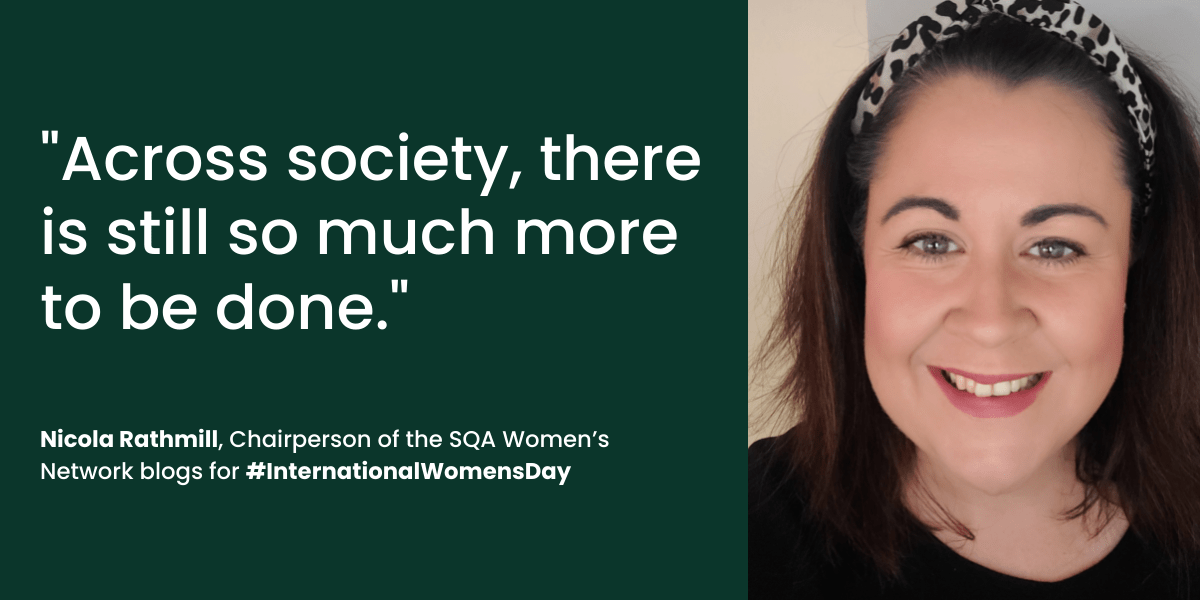At the SQA, we are focused on empowering women and promoting gender equality and equity in everything we do.
I am proud to have recently become the Chairperson for the SQA Women’s Network, a network that is focused on providing a welcoming space for women to come together and discuss issues that impact our lives and that are important to us.
We provide opportunities to get to know other women, to offer support, to raise awareness of issues that affect us and to influence SQA policy in areas of equality and inclusion.
Our network was founded in 2018 and consists of over 50 women, across a wide range of roles and levels. Over the years, the network has contributed to many important topics including the creation of menopause guidance and period poverty.
I’m so proud to be part of the Women’s Network and the work that we do – but across society, there is still so much more to be done. Last year, a study found that whilst work is being done to close the gender pay gap, no country had yet achieved this, and the UK ranked 22nd out of 146 countries. The gender pay gap sits at an average of 14.9%, which equates to 54 days’ pay. That effectively means women work for free for nearly 2 months of the year compared to the average man in employment. This pay gap widens once a woman becomes a mum and older women can take a financial hit when caring for older relatives as well as Grandchildren.
At the time of writing, SQA’s gender pay gap is 5.6%. While this figure is significantly better than the UK average, a gap remains: that’s why a Women’s Network is so important.
The 2023 International Women’s Day campaign theme for this year is #EmbraceEquity and calls on everyone to challenge gender stereotypes, call out discrimination, seek out inclusion and draw attention to bias.
When we discuss women’s equality, it is important to understand what that means, and how it differs from Equity. Equality means each individual or group of people are given the same resources or opportunities. Equity recognises that each person has different circumstances, and allocates the exact resources and opportunities needed to reach an equal outcome. In other words, it’s about not about giving everyone the exact same thing, it’s about giving everyone what they need to be successful.
As a woman in leadership, I have faced discrimination and bias in my career on several occasions. An ex-employer once told me I couldn’t go on the same business trip as my male peer, because I was a young woman, and it wasn’t “safe”. At the time I didn’t say anything, I don’t think I recognised it as discrimination, to be honest. It wasn’t until a few days later that I had a conversation with someone who made me realise what had happened. At that moment, I vowed to ensure that my voice was always heard, and I have had a passion for equality and inclusion ever since. I think as a woman, the bias we experience changes depending on what stage of life we are at, but it increases when you start a family.
Forging gender equity isn’t limited to women solely fighting the good fight. Allies are incredibly important for the social, economic, cultural, and political advancement of women. Each one of us can support and embrace equity within our own lives to make the world a better place for future generations. We can all challenge gender stereotypes, call out discrimination and draw attention to bias in our daily lives and I would ask that you do it for yourself and for your daughters, sisters, wives, mothers, grandmothers, friends, and colleagues.
Together we can forge women’s equality, collectively we can all #EmbraceEquity.







